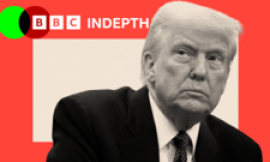President Trump’s promise to hit the United States’ trading partners with tit-for-tat tariffs — including penalties for taxes that he claims the European Union unfairly imposes on American imports — could hardly come at a worse time for the continent.
Mr. Trump on Thursday signed a memo directing his teams to prepare by April “reciprocal” tariffs on foreign countries, essentially imposing the same level of tax on imports that those countries place on American goods. The move threatens to upset a system of global trade established at the end of World War II.
The announcement comes as Europe’s economies, including the bloc’s powerhouses, Germany and France, are suffering from lackluster growth, high energy costs and inflation challenges stemming from the war in Ukraine.
Europeans were already reeling from the United States’ upending the alliance on Ukraine and insisting it would dominate artificial intelligence.
“Within 24 hours, the Trump administration has articulated a broad-based pivot away from Europe, both with respect to NATO and with respect to trade,” said Barbara Matthews, a senior fellow with the Atlantic Council. “The economic impact in Europe may be considerable.”
To make matters worse, Mr. Trump has thrown in an explosive grievance: the value-added tax, a system used by more than 140 countries to raise revenue through levies on domestic and imported goods. Economists said his complaint could be used as a lever to push possible tariffs on U.S. imports even higher.
Thank you for your patience while we verify access. If you are in Reader mode please exit and log into your Times account, or subscribe for all of The Times.
Thank you for your patience while we verify access.
Already a subscriber? Log in.
Want all of The Times? Subscribe.




